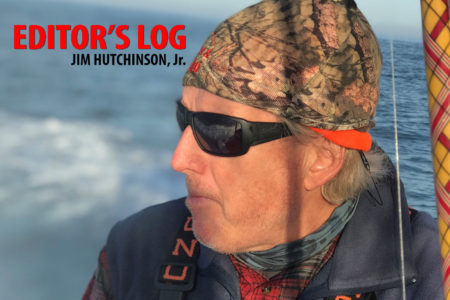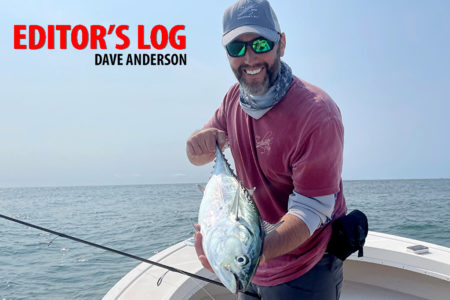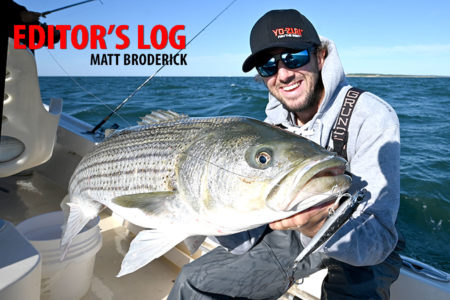I just finished pouring over the public comments submitted in response to the proposal by the Massachusetts Division of Marine Fisheries (DMF) to increase striped bass commercial fishing days from 2 to 4 per week due to the projected inability to fill the annual quota. While I agree with much of the nearly 700 pages of opposition to the change, one major item jumped out at me: the continued blame of the commercial industry for the current problem with the striped bass stocks.
Once again, before I go any further and you jump all over me for being a commercial fisherman, I will reiterate that which I have stated many times before: I am not currently, nor have I ever been, a commercial fisherman. I have never sold any fish legally or otherwise, and I do not currently plan on doing so. Ok, with that out of the way, let’s proceed and get back to the opposition to the increase in commercial days in Massachusetts in order to fill this year’s striped bass quota.
Repeatedly I read in the public comments that simply ending commercial fishing is the “magic bullet” of solving the striped bass problem. Many comments not only came out in opposition of adding days but the suggestion to end commercial fishing altogether was a common theme as well. I would like you to refer back to my editor’s log from April, 2019 (When Catch & Release Goes Awry) in which I discussed the 2017 harvest figures for striped bass as provided by the Atlantic States Marine Fisheries Commission (ASMFC) and their findings which indicate that 90% of the annual harvest (6,309,000 fish) is accounted for by the recreational sector. Keep in mind that while this figure does in fact include shore-based, private-boat and for-hire anglers, the vast majority comes from the private boater and shore anglers. Despite what some might have us think, at least according to the ASMFC’s figures, it is not A) commercial fishing, or B) for-hires who are killing off all the bass. Also please keep in mind that illegal, black market, poaching, or whatever term you’d like to assign to it is not figured into these landings as the actual value is impossible to quantify.
Ok, so back to the original subject which I have once again swayed away from, the adding of open days to the commercial striped bass fishery in Massachusetts in order to assist in meeting this year’s quota. Officially I am opposed to such action as I feel that increasing any harvest, whether it be commercial or recreational, is a bad thing for striped bass right now. However, the concept of increasing the available commercial days does not increase the state’s quota. Instead its intent was simply to allow for the state’s commercial fishermen to perhaps meet the quota for the year as current projections have it failing to do so as occurred last year. No additional fish would be given to the state. (I will make the side note here that by not opening up the additional days then in all likelihood less fish will be harvested, but it doesn’t mean that any theoretically additional fish can be harvested above and beyond the existing quota.) Unlike on the recreational side, the ASMFC strictly regulates how many fish may be commercially harvested each year. Failure to harvest said fish does not result in additional fish available next season as some might have you believe either.
There is no hard cap for the number of fish which we can harvest each year in the recreational sector, and the managers instead try to limit the number of fish we can harvest by setting minimum size limits where it is perceived to be just difficult enough for the majority of anglers to fail to catch a fish of harvestable size on an average outing. When this fails to work out as intended and harvest numbers are estimated as being higher than the stock can support, the size and bag limits are adjusted as occurred in 2014 and as will be the case in 2020.
So perhaps finally getting back around to the points which I initially set out to make here, I pose this question to you and it is something of which I have said many, many times before. When will we (all recreational anglers) begin to take a long, hard look in the mirror and accept that perhaps we need to take the steps necessary to save the fish, as we so often claim to want to do? Rather than blaming the other guys—commercial fishermen in this example—why not discuss options and ideas which will limit or reduce our harvest, the place from which it is almost undeniably greatest? You want the commercial fishermen to lose days where it is legal to harvest striped bass, but would you too accept the same type of limitation? And by the very fact that catch and release comes with a level of release mortality—roughly 9% as estimated by the ASMFC—then this would mean that we as recreational anglers might be required to have closed recreational days so that zero “harvest” would occur. Would you accept being prohibited from targeting striped bass on say Sunday and Monday of every week of the season, or would this be going too far and be more than you’re really willing to give up “for the best interest of the fish”? What about some meaningful seasonal closures? I’m not talking about closing down timeframes at the beginning or end of the migration when few fish are caught, but instead smack dab in the middle of the prime fishing timeframe, like for instance the entire month of July?
Now I am not suggesting that this actually take place because, well, selfishly I’d have a really tough time swallowing such a big pill, but that is really at the essence of what so many of us are proposing when we say “close down commercial fishing” as a way to manage the striped bass population. I guess in the end I am just as bad as the next guy who says they know the answer but who is unwilling to make the sacrifice for change.
Ultimately the DMF did not take any action on the proposal, citing “…updated commercial landings data and quota utilization projections. The extensive public comment was also taken into consideration.” Stay tuned to www.TheFisherman.com for details on when and where the ASMFC will be holding its public hearings on Addendum VI so that you can submit your public comments on how the striped bass fishery will be managed in 2020 and beyond.




